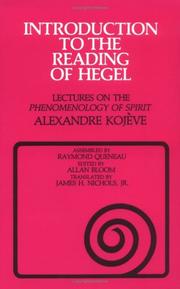| Listing 1 - 10 of 10 |
Sort by
|

ISBN: 0801471486 0801471494 9780801471490 0801435307 9780801435300 1322523134 Year: 2014 Publisher: Ithaca, NY : Cornell University Press,
Abstract | Keywords | Export | Availability | Bookmark
 Loading...
Loading...Choose an application
- Reference Manager
- EndNote
- RefWorks (Direct export to RefWorks)
With a masterful sense of the place of rhetoric in both thought and practice and an ear attuned to the clarity, natural simplicity, and charm of Plato's Greek prose, James H. Nichols Jr., offers precise yet unusually readable translations of two great Platonic dialogues on rhetoric.The Gorgias presents an intransigent argument that justice is superior to injustice: To the extent that suffering an injustice is preferable to committing an unjust act. The dialogue contains some of Plato's most significant and famous discussions of major political themes, and focuses dramatically and with unrivaled intensity on Socrates as a political thinker and actor. Featuring some of Plato's most soaringly lyrical passages, the Phaedrus investigates the soul's erotic longing and its relationship to the whole cosmos, as well as inquiring into the nature of rhetoric and the problem of writing.Nichols's attention to dramatic detail brings the dialogues to life. Plato's striking variety in conversational address (names and various terms of relative warmth and coolness) is carefully reproduced, as is alteration in tone and implication even in the short responses. The translations render references to the gods accurately and non-monotheistically for the first time, and include a fascinating variety of oaths and invocations. A general introduction on rhetoric from the Greeks to the present shows the problematic relation of rhetoric to philosophy and politics, states the themes that unite the two dialogues, and outlines interpretive suggestions that are then developed more fully for each dialogue.The twin dialogues reveal both the private and the political rhetoric emphatic in Plato's philosophy, yet often ignored in commentaries on it. Nichols believes that Plato's thought on rhetoric has been largely misunderstood, and he uses his translations as an opportunity to reconstruct the classical position on right relations between thought and public activity.
Rhetoric --- Love --- Political science --- Ethics --- Early works to 1800.

ISBN: 9780742527775 Year: 2007 Publisher: Lanham Rowman & Littlefield
Abstract | Keywords | Export | Availability | Bookmark
 Loading...
Loading...Choose an application
- Reference Manager
- EndNote
- RefWorks (Direct export to RefWorks)

ISBN: 074252776X 0742569764 Year: 2007 Publisher: Lanham, Maryland : Rowman & Littlefield Publishers, Inc.,
Abstract | Keywords | Export | Availability | Bookmark
 Loading...
Loading...Choose an application
- Reference Manager
- EndNote
- RefWorks (Direct export to RefWorks)
Nichols examines the major writings of Alexandre Koj_ve, and clarifies the character and brings to light the importance of his political philosophy. This is an essential assessment of Koj_ve which considers the works that preceded his turn to Hegel, seeks to articulate the character of his Hegelianism, and reflects in detail on the two different meanings that the end of history had in two different periods of his thought.
History --- Philosophy --- Philosophy. --- History. --- Kojève, Alexandre, --- Hegel, Georg Wilhelm Friedrich,
Multi
ISBN: 9780801471490 Year: 2014 Publisher: Ithaca, N.Y. Cornell University Press
Abstract | Keywords | Export | Availability | Bookmark
 Loading...
Loading...Choose an application
- Reference Manager
- EndNote
- RefWorks (Direct export to RefWorks)
Book
ISBN: 9781461948254 1461948258 9781617051890 1617051896 9781620700303 1620700301 Year: 2014 Publisher: New York, NY Demos Medical Pub.
Abstract | Keywords | Export | Availability | Bookmark
 Loading...
Loading...Choose an application
- Reference Manager
- EndNote
- RefWorks (Direct export to RefWorks)
As with other volumes in the Diagnostic Standards of Care series, Clinical Chemistry focuses specifically on understanding potential problems and sources of error in management of the clinical chemistry testing procedures, how to anticipate and avoid such problems, and how to manage them if they occur. The discussions are concise, practical, specific, and problem-based so the book directly addresses the situations and issues faced by the clinical pathologist or other manager or staff member of the chemistry team. Discussion of each problem is augmented by a case discussion giving a real-world
Clinical chemistry. --- Diagnosis, Laboratory. --- Clinical medicine --- Clinical pathology --- Diagnostic laboratory tests --- Laboratory diagnosis --- Laboratory medicine --- Medical laboratory diagnosis --- Diagnosis --- Pathology --- Chemistry, Clinical --- Diagnostic biochemistry --- Diagnostic chemistry --- Medical chemistry --- Biochemistry --- Diagnosis, Laboratory

ISBN: 0801492033 9780801492037 Year: 1980 Publisher: Ithaca (N.Y.): Cornell university press
Abstract | Keywords | Export | Availability | Bookmark
 Loading...
Loading...Choose an application
- Reference Manager
- EndNote
- RefWorks (Direct export to RefWorks)
Hegel, Georg Wilhelm Friedrich --- Phénoménologie. --- Dialectique. --- Phänomenologie des Geistes (Hegel) --- Phänomenologie des Geistes --- Hegel, Georg Wilhelm Friedrich, --- Hegel, Georg Wilhelm Friedrich (1770-1831). --- Et la mort. --- Phänomenologie des Geistes (Hegel, Georg Wilhelm Friedrich) --- Hegel, Giorgio Guglielmo Frederico --- Phänomenologie des Geistes (Hegel). --- Phänomenologie des Geistes. --- Phänomenologie des Geistes (Hegel, Georg Wilhelm Friedrich).
Book

ISBN: 9781400875733 Year: 2015 Publisher: Princeton, NJ
Abstract | Keywords | Export | Availability | Bookmark
 Loading...
Loading...Choose an application
- Reference Manager
- EndNote
- RefWorks (Direct export to RefWorks)
Book

ISBN: 9781501744662 Year: 2019 Publisher: Ithaca, NY
Abstract | Keywords | Export | Availability | Bookmark
 Loading...
Loading...Choose an application
- Reference Manager
- EndNote
- RefWorks (Direct export to RefWorks)
Digital

ISBN: 9781400875733 9780691625300 Year: 2015 Publisher: Princeton, N.J. Princeton University Press
Abstract | Keywords | Export | Availability | Bookmark
 Loading...
Loading...Choose an application
- Reference Manager
- EndNote
- RefWorks (Direct export to RefWorks)
Digital

ISBN: 9781501744662 Year: 2019 Publisher: Ithaca, N.Y. Cornell University Press
Abstract | Keywords | Export | Availability | Bookmark
 Loading...
Loading...Choose an application
- Reference Manager
- EndNote
- RefWorks (Direct export to RefWorks)
| Listing 1 - 10 of 10 |
Sort by
|

 Search
Search Feedback
Feedback About UniCat
About UniCat  Help
Help News
News